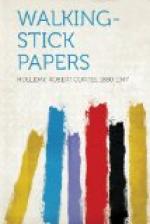It (he finds) injures him not, essentially; it ceases to particularly affect him, beyond his inward appraisement of the character before him. Toward him one acts simply in accordance with the instincts of one’s nature. His status counsels no constraint, invites no display, has no property of stimulation. Thus the view of a famous man’s character from the position of retail clerk is valuable. Mr. James’s manner with Mr. Brownell would hardly be the same as toward us. But it was, exactly. There was present in his mind at the moment, was quite apparent, absolutely no consciousness of any distance of mind, or position, between him and us. He sought conversation (any suggestion of so equalising a thing as conversation with a clerk is not uncommonly repressed by the important as preposterous). In his own talk with us, he seemed to us to be a man consciously striving with the material of words and sentences to express his thought as well as he could.
He was very earnest. He looked up at us constantly (we are a little tall) with fixed concentration of gaze, and moved his hand to and fro as though seeking to balance his ideas. He asked questions with deference. Among other things, he desired very much to know what per cent. of the novels on the fiction table was the product of writers in England. “I live in England myself,” he said, very simply, “and I am curious to know this.” He expressed a little impatience at the measureless flood of mediocre fiction, making a fluttering gesture conveying a sense of impotence to give it attention. He barely glanced at the pile of his own book, and did not mention it. He did not seem at first (though we believe later he changed this opinion) to think highly of Arnold Bennett (this was at the first bloom of Mr. Bennett’s vogue here), nor to have read him. “Oh, yes, yes; he is an English journalist,” in a tone as though, merely a journalist. Clear artist in fibre. When he took his departure he bade us “Good day,” and lifted his hat.
Succeeding visits caused us to suspect that Mr. James’s ideas of the machinery of business are somewhat naive. He seemed to regard us as, so to say, the whole works. It entered our head that maybe Mr. James thought we received and answered all manner of correspondence, editorial as well as that connected with the retail business, opened up in the morning, read, accepted, and rejected manuscript, nailed up boxes for shipment, swept out the shop, and were acquainted perfectly with all confidential matters of the House. “I wrote you” (us), “you know,” he said. And he referred by the way, apparently upon the assumption that the matter had been laid before us, to business of which we could not possibly have cognizance. And then he desired to send some books. Fumbling in his breast pocket, he produced a letter, from which he read aloud a list of his own works apparently requested of him. Carefully replacing his letter, he said: “I should like to send these books to my sister-in-law.” With that he started out.




